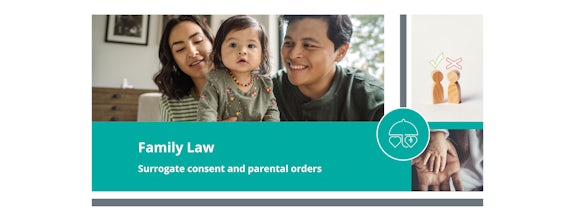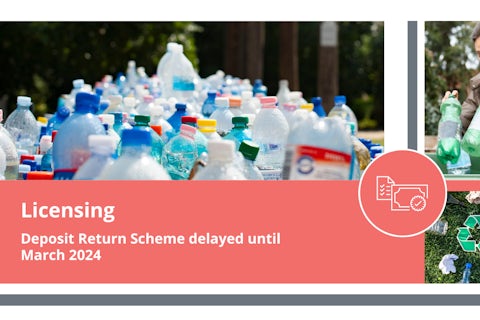The Law Commission of England & Wales and the Scottish Law Commission conducted a public consultation on their provision proposals to reform the law governing surrogacy arrangements in the UK to reflect the wishes of surrogates and intended parents. What the Law Commissions have proposed will allow intended parents to become legal parents of any child born through a surrogacy arrangement from birth, subject to the surrogate retaining a right to object for a defined period after the birth, a new pathway to protect and safeguard the interests of all involved in a surrogacy arrangement. Following analysis of the responses submitted to the consultation, a much anticipated final report and draft Bill is expected to be published on 29 March 2023 which many will welcome standing the current law is acutely out of step with modern fertility practises, attitudes and modern family structures.
In the meantime, Current law recognises surrogates and their spouses/civil partners as the legal parents of children born through surrogacy. Parenthood is transferred to the intended parents through a “parental order” by the courts.
The Human Fertilisation and Embryology Act 2008 s 54 ss (2) –(8) sets out the conditions which should be satisfied in order for a parental order to be made. In particular section 6 states ;
The court must be satisfied that both—
(a) the woman who carried the child, and
(b) any other person who is a parent of the child but is not one of the applicants (including any man who is the father by virtue of section 35 or 36 or any woman who is a parent by virtue of section 42 or 43),have freely, and with full understanding of what is involved, agreed unconditionally to the making of the order.
Essential guidance has recently been issued by on the subject of consent in Re C (Surrogacy: Consent) [2023] EWCA Civ 16 whereby the Court of Appeal provided direction on the requirement for consent being obtained from the surrogate.
In this case the intended parents and the surrogate met in 2018, signed a surrogacy agreement in 2019. In November of that year, following artificial insemination using the egg of the surrogate and sperm of one of the intended parents, the surrogate became pregnant.
By spring 2020, the parties’ relationship had deteriorated with the surrogate becoming increasingly emotionally attached to the unborn baby and the parents feeling excluded and kept at arm’s length. Despite these deteriorations, when the child was born in September 2020 the surrogate handed over the child to the intended parents as per the agreement.
The intended parents applied for a Parental Order in November 2020. In January 2021 the surrogate returned her acknowledgment of service form to the Court stating she did not consent to the making of the Parental Order. The parties attended mediation in an attempt to repair the relationship and rebuild trust. A Parental order reporter was appointed who subsequently was unable to recommend a Parental Order being made due to the fact that the surrogate mother wanted to keep her parental responsibilities to allow her rights to spend time with the child.
The Surrogate thereafter filed a statement with court in which she acknowledged that it was always anticipated that she would consent to a parental order but her position had changed because of her unexpected feelings for the child and because she had anticipated being a significant person to him, but she now felt pushed out. She stated that she would consent to a parental order being made on two conditions: that a child arrangements order was made providing for monthly contact with her and that a prohibited steps order was made preventing the intended parents from moving without her written agreement.
On 11 August 2021, the application came before the judge. The intended were represented by counsel and the Court made a Parental Order alongside a Child Arrangements Order, consisting of a ‘lives with’ order in favour of the intended parents and a contact order whereby the child would spend one weekend day with the surrogate every six weeks and two additional weekend days each year to celebrate his birthday and Christmas. The very next day, the surrogate made contact with the intended parent’s legal team to express she felt under pressure to consent to the order but at that stage no appeal was lodged.
The contact order began, and contact took place. However, one scheduled contact did not take place. The intended parents then applied to discharge the terms of the contact order and they did not allow further contact thereafter
The surrogate then sought permission to appeal the parental order out of time
The surrogate appealed on two grounds:
- Her consent was not given “unconditionally” because it was upon the condition of a Child Arrangements Order being made and;
- Her consent was not provided “freely”.
The intended parents argued that the necessary consent was given, but even if it was found not to be the case, they contended that irrespective, the parental order should be left in place and section 54(6) of the Human Fertilisation and Embryology Act 2008 can be read in a way as to confer a dispensing power upon the court.
The Court of Appeal considered the wording of Section 54(6) of the Human Fertilisation and Embryology Act 2008 and expressed the right of the surrogate not to provide consent is a “pillar” of the legislation.
The Court confirmed that if there is any doubt about consent, it will be a matter for the Court to judge, considering all circumstances. What is required is a consent that is free, informed and unconditional. If that is achieved, it is immaterial whether the consent is given gladly or reluctantly. The court also confirmed that consent should be in writing. Even then, consent can be withdrawn at any stage before the order is made. This formality is not mandatory but, its absence, should put the court on its guard to ensure the consent is valid.
In this case, the consent was given orally during court hearing and as such, any stated consent was diminished due to the possibility the court process might in itself be exerting pressure on the surrogate. Additionally the consent given was stated by the surrogate not to have been given unconditionally.
As a result, the Court of Appeal allowed the appeal by the surrogate and dismissed the intended parent’s application for a Parental Order. The Court confirmed the child should be brought up by the intended parents and have contact with the surrogate as was intended by all.
This case reiterates the importance of obtaining free and unconditional consent from a surrogates to a parental order and reiterated the importance of this consent to be provided in writing.
Gilson Gray has an expert team of solicitors who can help guide you through the surrogacy process.. If you would like further information regarding the topic discussed in this blog, please contact Sarah Feeney by email – sfeeney@gilsongray.co.uk or telephone 0141 530 2021
You can also visit our Family Law Team page for more information here.
The information and opinions contained this blog are for information only. They are not intended to constitute advice and should not be relied upon or considered as a replacement for advice. Before acting on any information contained in this blog, please seek solicitor’s advice from Gilson Gray.








